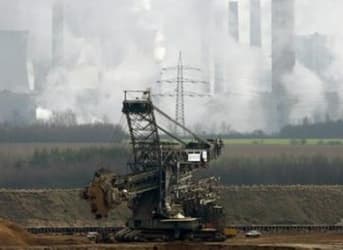Amid a major phase out of nuclear power, Germany is weighing whether or not to undertake another monumental energy transition – shutting down a significant portion of its coal-fired power plant fleet.
In 2011, Germany decided to shut down its nuclear reactors within a decade, a bold response in the aftermath of the Fukushima meltdown. The so-called energiewende – or energy transition – is an audacious plan to rapidly switch from large baseload nuclear power to renewable energy, primarily from solar and wind.
A second energy transition is being considered in Berlin. The German government is negotiating with utilities to close coal-fired power plants in order to slash carbon emissions by 22 million tons by 2020, according to Reuters. That could lead to the closure of 8 gigawatts of coal capacity.
The motivation comes from the trajectory of Germany’s carbon pathway. Germany is projected to miss its climate targets – a 40 percent reduction below 1990 levels by 2020 – if it does not step up its efforts.
Related: Will Coal Be Cut Entirely From German Energy Mix?
Germany is charting an impressive path forward with renewable energy. Renewable energy surpassed lignite coal as the country’s largest source of electricity generation, making up 27.7 percent of Germany’s electricity in the first nine months of this year.
The problem is the pace at which Germany’s nuclear reactors are shutting down, which has led to an uptick in its coal consumption. Consumption of lignite increased from 24.5 percent in 2011 to 25.5 percent in 2013, and hard coal’s share jumped from 18.3 to 19.3 percent over the same timeframe as well.
Critics of the energiewende say that intermittent renewable energy cannot supply reliable power. “We can't simultaneously get out of nuclear and coal,” Vice Chancellor Sigmar Gabriel said.
Already having been battered by the energiewende, Germany utilities are resisting the rumored plan to shut down coal plants. “The industry has made clear that the current difficult situation for power plant operators leaves no scope for further unilateral concessions without fundamental reforms,” BDEW, a German utility lobby group, said in a statement.
But 2014 could actually prove to be an opportune time to undertake such a plan. The rapid installation of solar and wind has created a surplus of power, depressing wholesale electricity prices. At certain times of the day when solar and wind are generating full tilt, electricity prices even go negative.
As a result, there is a potential for a win-win scenario – reducing carbon emissions while pulling slack electricity capacity off the market, according to a study from the German Institute for Economic Research. “We have excess capacity, it would be the right time,” the report’s lead researcher Claudia Kemfert said.
By shutting down excess coal capacity, Germany could boost its wholesale power prices, perhaps as much as 33 percent. That could provide an economic lifeline to utilities reeling from low prices. Related: Ukraine Facing Harsh Winter Due To Coal Shortages
The outcome is far from certain. Germany is set to announce a decision on whether or not to proceed on December 3. There is reportedly infighting within Chancellor Merkel’s government. The Environmental Minister Barbara Hendricks is pushing hard for a coal phase out, but is meeting resistance from Vice Chancellor Gabriel.
If Germany ultimately decides not to pursue a coal phase out along with its nuclear phase out, it will still have to put forward a series of plans to achieve its climate targets. Germany is on track to reduce carbon emissions by 33 percent below 1990 levels by 2020, seven percentage points short of its stated goal.
ADVERTISEMENT
Germany has been a pioneer on scaling up renewable energy and demonstrating the viability of powering an industrialized economy on solar and wind. The government may not agree to a second energiewende in early December, but given its track record, Germany will continue to slash its carbon emissions one way or another – which means that coal’s share of the German electricity market, despite its recent uptick, will decline in the years ahead.
By Nick Cunningham of Oilprice.com
More Top Reads From Oilprice.com:
- The High Cost Of Renewables
- Winter Gas Supply Crunch In Europe Unlikely, Experts Say
- How Energy Secure Are The EU And UK?



















They should use this cheap electricity to generate hydrogen from water. Battery storage is only good for an hour here or there, hydrogen could store energy on a much bigger scale.